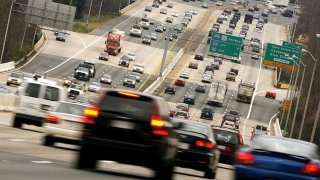
A bill that aims to reduce carbon pollution in part by getting more zero-emissions vehicles on the road cleared a key hurdle in the Virginia Senate on Friday.
The measure, considered a top priority this year for environmental advocates, would require that starting in 2024 a certain percentage of new passenger vehicles sold by manufacturers be electric or hybrid electric. The bill is advancing along with several relatedpieces of legislation, including ameasure that would invest public money in rebates for electric vehicle purchasers.
“We must address the climate crisis with the urgency and seriousness that this problem demands, and today, Virginia lawmakers did exactly that by passing the Clean Car Standards," Lena Lewis, energy and climate policy manager for The Nature Conservancy in Virginia, said in a statement. "These standards will simultaneously broaden consumer choice, improve public health, and reduce carbon emissions.”
The mechanism for reaching the mandated vehicle sales threshold — which would start at roughly 8% in 2024 and then increase each year — involves adopting California’s vehicle emissions standards, which are stricter than the federal standard Virginia currently follows. California has had the authority to set its own for decades under a waiver from the federal Clean Air Act.
The program applies to manufacturers, not car dealers. Manufacturers who aren’t in compliance can buy credits from others who have surpassed the target.
Advocates of the bill say some automakers prioritize sending their electric vehicles, or EVs, to states that use California’s standards. They say that’s meant supply isn’t meeting demand, especially outside of northern Virginia.
Local
Washington, D.C., Maryland and Virginia local news, events and information
The hope is that the measure will make it easier and more likely that Virginians will choose a zero-emissions vehicle and in turn help reduce pollution from the transportation sector, which federal data shows is Virginia’s largest source of heat-trapping carbon dioxide.
Walton Shepherd, Virginia policy director at the Natural Resources Defense Council, said Virginia's move is another example of momentum for cleaner vehicles accelerating across the U.S.
“Automakers are promising to transform their fleets; the Biden administration is pressing ahead with strong national standards; and states are stepping up to ensure that their consumers benefit, too," he said in a statement.
Lawmakers who have opposed the bill have raised concerns about tying Virginia's policy to California.
“They’ve had two major utilities go bankrupt in the last 21 years and they’ve had numerous brownouts," said Senate Majority Leader Dick Saslaw, the lone Democrat who voted against the measure in a committee hearing. He ultimately voted for it on Friday.
The measure, sponsored by Del. Lamont Bagby, would also have Virginia adopt California's low-emission vehicle standard, which requires manufacturers to steadily roll out cleaner vehicles over time.
During a hearing on the bill, Don Hall, president and CEO of the Virginia Automobile Dealers Association, said that his association supports the bill with “great enthusiasm.”
“We shall go forward and sell EVs in Virginia with your support," he said.
The Alliance for Automotive Innovation, which represents most automakers, initially opposed the bill but later adopted a neutral position.
“We will continue working collaboratively with the Commonwealth, the environmental community, our dealers, EV advocates, and others, to address critical funding for important elements,” John Bozzella, the group's CEO, said in a statement. "That includes consumer incentives, infrastructure development, and state fleet EV adoption.”
The measure now goes back to the House, which must approve changes the Senate made before it can go to Democratic Gov. Ralph Northam.
A member of Northam’s administration has previously said the governor supports the measure.
This year's push to clean up transportation pollution comes after environmental advocates working with a new Democratic majority tackled carbon pollution in the power sector last year, passing the Virginia Clean Economy Act, which paved the way for an enormous expansion of renewable energy generation.



